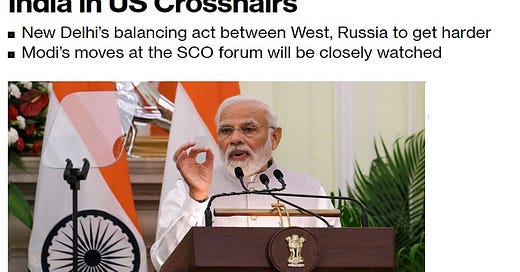It’s Not Any Of The US’ Business What PM Modi Does At The SCO Summit
India has no reason to be concerned about the US’ reaction to Prime Minister Modi’s participation in this year’s SCO Summit in Samarkand, especially the optics of him “looking chummy” with the Russian and Chinese leaders like Bloomberg fearmongered might trigger that declining unipolar hegemon.
Bloomberg headlined a piece on Thursday about how “Modi’s Outreach to Putin Risks Putting India in US Crosshairs”, which is paywalled but can be read for free here. Its purpose is clearly to fearmonger about the potential consequences of Prime Minister Modi’s participation in this year’s SCO Summit in Samarkand, particularly how the US might react to the optics of him “looking too chummy” with Presidents Putin and Xi, the leaders of its two peer competitors. Unsurprisingly, the piece lacks any tangible substance, being just a collection of speculation and supportive quotes from several analysts whose views align with the article’s narrative.
Even so, it’s still important to remind everyone that it’s not any of the US’ business what Prime Minister Modi does at the SCO Summit since India is a strategically autonomous rising power in the global systemic transition to multipolarity. Although State Department spokesman Price openly admitted that America will continue meddling in India’s foreign policy by continuing to pressure it into unilaterally worsening ties with Russia in full contradiction of Delhi’s objective national interests, his declining unipolar hegemon is still reluctant to meaningfully punish its partner for retaining ties with Moscow. To Bloomberg’s credit, this observation is also touched upon in their analysis, albeit tangentially.
Moving along, the next point to make is that intrepid readers can learn more about India’s balancing act by reviewing the author’s recent response to C. Raja Mohan that hyperlinks to several related analyses. These include his piece for the prestigious Russian International Affairs Council (RIAC) earlier this summer about how “India Is Irreplaceable Balancing Force in Global Systemic Transition” as well as its follow-up that was published elsewhere explaining how “Speculation About Russia Becoming A Chinese Puppet Ignores India’s Decisive Balancing Role”. Drawing attention to those two in particular is intended to inform the reader of the grand strategic reasons why India continues cultivating close ties with Russia.
Bloomberg, however, seemingly wants its readers to expect that the era of India’s balancing act between the US-led West’s Golden Billion and the BRICS-led Global South is about to end. As is the indisputable trend on display by the Mainstream Media (MSM), including India’s own and not to mention from those of its media professionals who sympathize with the Golden Billion like that outlet’s two authors appear to do, the innuendo is that this proud civilization-state should accept voluntarily submit to becoming the Golden Billion’s “junior partner” before it’s coerced into that status with even less “privileges” than if it willingly agreed to this.
The Damocles’ sword that the targeted audience is always reminded of is India’s unresolved disputes with neighboring China, with it being hinted that only the Golden Billion can help Delhi deal with any unexpected contingencies along their frontier, ergo the need to first submit to becoming their “junior partner” as a quid pro quo for that support. What this seemingly enticing information warfare narrative fails to mention, however, is that India and China recently reaffirmed their shared long-term goal of jointly pioneering the Asian Century. This contributed to the mutual disengagement of their forces from the disputed frontier and thus accelerated South Asia’s ongoing grand strategic reorientation.
Against this recent context, the carrot for convincing the Indian elephant to continue walking into the neo-imperialist trap being set for it by the Golden Billion’s geopolitical poachers becomes much less attractive. Considering that they’re reluctant to resort to using their sticks out of fear that it’ll trample them in fury if it survives their attacks as is expected, this means that the West is likely to just let India be despite grumbling about this from time to time and probably continuing to wave low-level information warfare against it. After all, any further pressure that they impose upon it could have the counterproductive consequence of speeding up its rapprochement with their Chinese rival.
For these reasons, India has no reason to be concerned about the US’ reaction to Prime Minister Modi’s participation in this year’s SCO Summit in Samarkand, especially the optics of him “looking chummy” with the Russian and Chinese leaders. His multipolar Great Power has unprecedentedly excellent relations with the former while it’s presently working to improve its very promising ones with the latter, though these haven’t occurred at the expense of its ties with the US except if Washington wants to unilaterally worsen them on those pretexts. That declining unipolar hegemon will always remain reluctant to do that though since it fears that whacking the elephant will only bring it closer to China.




